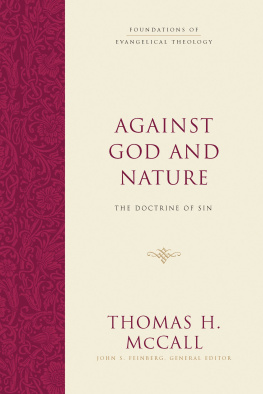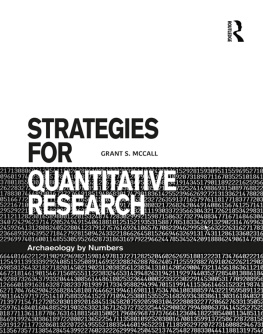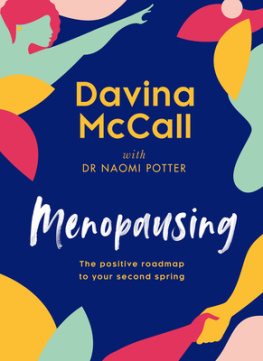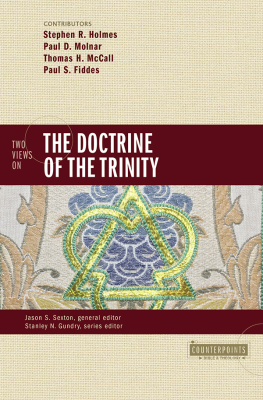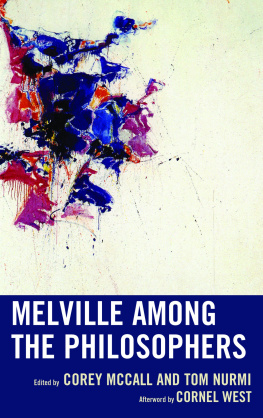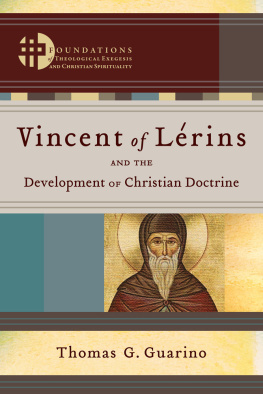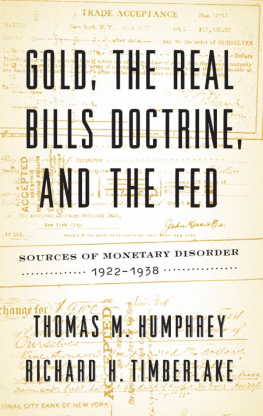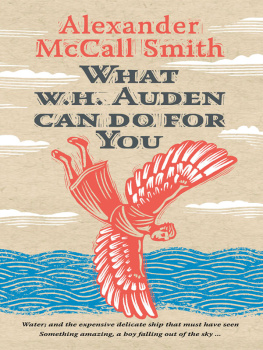Thomas H. McCall - Against God and Nature: The Doctrine of Sin
Here you can read online Thomas H. McCall - Against God and Nature: The Doctrine of Sin full text of the book (entire story) in english for free. Download pdf and epub, get meaning, cover and reviews about this ebook. year: 2019, publisher: Crossway, genre: Religion. Description of the work, (preface) as well as reviews are available. Best literature library LitArk.com created for fans of good reading and offers a wide selection of genres:
Romance novel
Science fiction
Adventure
Detective
Science
History
Home and family
Prose
Art
Politics
Computer
Non-fiction
Religion
Business
Children
Humor
Choose a favorite category and find really read worthwhile books. Enjoy immersion in the world of imagination, feel the emotions of the characters or learn something new for yourself, make an fascinating discovery.
- Book:Against God and Nature: The Doctrine of Sin
- Author:
- Publisher:Crossway
- Genre:
- Year:2019
- Rating:5 / 5
- Favourites:Add to favourites
- Your mark:
- 100
- 1
- 2
- 3
- 4
- 5
Against God and Nature: The Doctrine of Sin: summary, description and annotation
We offer to read an annotation, description, summary or preface (depends on what the author of the book "Against God and Nature: The Doctrine of Sin" wrote himself). If you haven't found the necessary information about the book — write in the comments, we will try to find it.
Against God and Nature: The Doctrine of Sin — read online for free the complete book (whole text) full work
Below is the text of the book, divided by pages. System saving the place of the last page read, allows you to conveniently read the book "Against God and Nature: The Doctrine of Sin" online for free, without having to search again every time where you left off. Put a bookmark, and you can go to the page where you finished reading at any time.
Font size:
Interval:
Bookmark:
Chapter Two
I. Introduction
For any recognizably Christian understanding of reality, the centrality of the sheer, unalterable, majestic, holy love of God is unavoidable. The holiness of the triune God is unmistakable in Scriptureand the blazing brilliance of Gods holiness shines into and exposes human life for what it really is. And what human life ismore properly, what it has become, what we have made of itis anything but a reflection of Gods own spotless purity and boundless love. When seen as a properly theological category, sin is revealed as the perversion, the twisting, the ruin, of humanity. And however skilled we may become at denial or avoidance (as we shall see, these are some of the very results of sin), God is too good to leave us in our delusion. Instead, we get the sober truth: All have sinned and fall short of the glory of God (Rom. 3:23). None is righteous (v. 10). The wages of sin is death (6:23).
II. Biblical Vocabulary
The wide range of biblical terms for sin testifies both to the importance of the concept in Scripture and to the difficulty involved in tight or neat definitions or descriptions of sin. We shall begin with a brief overview of some of the most common biblical terms for sin. While these terms are sometimes used synonymously (or with significant semantic overlap), they each make an important contribution to our recognition and understanding of sin. An initial overview of these basic biblical data will aid our broader study of the doctrine of sin.
A. Major Old Testament Terms for Sin
H , Ha , Hat ( )
Hattat is the most general term. Not surprisingly, it often appears in English translations simply as sin. But more basically, it means to deviate; to miss the mark. In some of its more than two hundred uses in the OT, it is used in a strictly literal and what we might call horizontal or non t heological sense. For instance, in Judges 20:16 we read of the seven hundred marksmen who could sling stones and not miss. But h a tta t is often used to speak of moral failure, and here it can refer to the whole gamut of human erring. Sometimes it is used with reference to those who fail unintentionally (e.g., Lev. 4:1314), while at other points it is used to describe those who in arrogance try to miss the mark.
Primarily, though, it simply expresses the fact: the target has been missed. As such, of course, it presupposes the idea of a target. There is a goal, a target, a mark. And the most basic point is this: the target has been missed. Sin is a failure to reach what was intended. As such, sin has an undeniably objective quality to it. Biblically, it cannot be reduced to a mere psychological sense of disapproval; it is not merely subjective. To fall short, to miss the mark, is to sin. Whether or not the sinner feels bad about it is rather beside the point. The mark, the target, the goal, the expectation or standard was thereand it was missed.
But a word of caution is in order here. Frank admission of the objectivity of sinwe are guilty of transgression whether or not we recognize it or admit it, whether we feel badly about it or notshould not lead us to overlook the volitional element that is often highlighted in the use of these terms. Understanding sin as missing the mark might encourage a view of sin as primarily unintentional. We sometimes picture someone such as a basketball player who, despite his complete concentration and best efforts, still misses the free throw when the game is on the line. The player surely missed the mark, but not for lack of intention or effort. Accordingly, we might be tempted to think that sin is primarily to be understood as something that we intend to avoid but just cannot quite escape. In other words, despite our best and unwavering intentions to do the right thing, we nonetheless fail.
Awn ( )
The volitional element is seen much more clearly and emphasized even more strongly in the biblical language that speaks of perversion. In the OT, awn is more focused on the personal causesand effectsof sin. Often appearing in English translations as iniquity or guilt, the word connotes twistedness, and the basic idea is one of perversion.
Directly in contrast to what is straight, upright, well -f ormed , and healthy, sin is what is morrally misshapen, crippled, broken, misleading, and crooked. Again, this presupposes something that is right, well -f ormed , and healthy, and it paints a picture of sin as the twisting or perversion of that rightness and health. But the emphasis in this case clearly falls upon personal engagement. It is not as if the sinful person merely suffers the effects of (someone elses) sin; rather it is the sinner who willfully chooses that which ultimately will warp and twist him to the core of his being.
The sinful actions (of h atta , h attat ) come from an inner twistedness or perversion ( awn ). Awn occurs repeatedly in Isaiah 59:27, and this passage illustrates vividly the nature of this perversion and its effects:
[But] your iniquities have made a separation
between you and your God,
and your sins have hidden his face from you
so that he does not hear.
For your hands are defiled with blood
and your fingers with iniquity;
your lips have spoken lies;
your tongue mutters wickedness.
No one enters suit justly;
no one goes to law honestly;
they rely on empty pleas, they speak lies,
they conceive mischief and give birth to iniquity.
They hatch adders eggs;
they weave the spiders web;
he who eats their eggs dies,
and from one that is crushed a viper is hatched.
Their webs will not serve as clothing;
men will not cover themselves with what they make.
Their works are works of iniquity,
and deeds of violence are in their hands.
Their feet run to evil,
and they are swift to shed innocent blood;
their thoughts are thoughts of iniquity;
desolation and destruction are in their highways.
This is a perversion that reaches and poisons everything.
The Hebrew term awel is similar, and it is often translated wickedness, injustice, or unrighteousness. This word often expresses the idea of twistedness or perversion with great force. It is the opposite of justice and righteousness. More precisely, it is the opposite of the justice and righteousness of God , who is the standard of righteousness and justice. As Deuteronomy 32:4 says of God, God is to be understood as the Rock, his work is perfect, for all his ways are justice. A God of faithfulness and without iniquity, just and upright is he. To be sinful is to pervert those standards, to twist them for our own purposes.
Pea ( )
More directly volitional yet is the language of rebellion. The Hebrew word pasa expresses this idea, and the usages of it in the OT do so poignantly. Synonyms are marad (which carries political overtones) and bagad (which connotes personal treachery). What we see here is a violation of trust; here we have personal rebellion against a sovereign and betrayal of a trusting parent. This rebellion is intentional; it is done directly to the other party and in full (or at least adequate) awareness of the nature of the act. As rebels commit treason against the house of David (e.g., 1 Kings 12:19), so also humans rebel against their Creator and Lord when they commit sinful actions.
So sin is rebellion, but it is not rebellion against some abstract standard or distant moral code. No, it is rebellion against God. It is treason against the good governance of the Sovereign, and it is betrayal of the trusting love of the Father. As Isaiah
R e a ( )
The Hebrew word resa (and its cognates) points to the wickedness and resulting guilt of sin. e.
Ra ( )
The term ra is a general term for evil. It encompasses both what is now sometimes referred to as natural evil and moral evil or sin. But often it is used powerfully to refer to the affections and actionsand the results of those actionsof sinful people. As Jensen observes, [T]he refrain in
Font size:
Interval:
Bookmark:
Similar books «Against God and Nature: The Doctrine of Sin»
Look at similar books to Against God and Nature: The Doctrine of Sin. We have selected literature similar in name and meaning in the hope of providing readers with more options to find new, interesting, not yet read works.
Discussion, reviews of the book Against God and Nature: The Doctrine of Sin and just readers' own opinions. Leave your comments, write what you think about the work, its meaning or the main characters. Specify what exactly you liked and what you didn't like, and why you think so.

